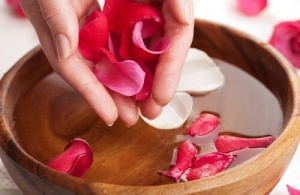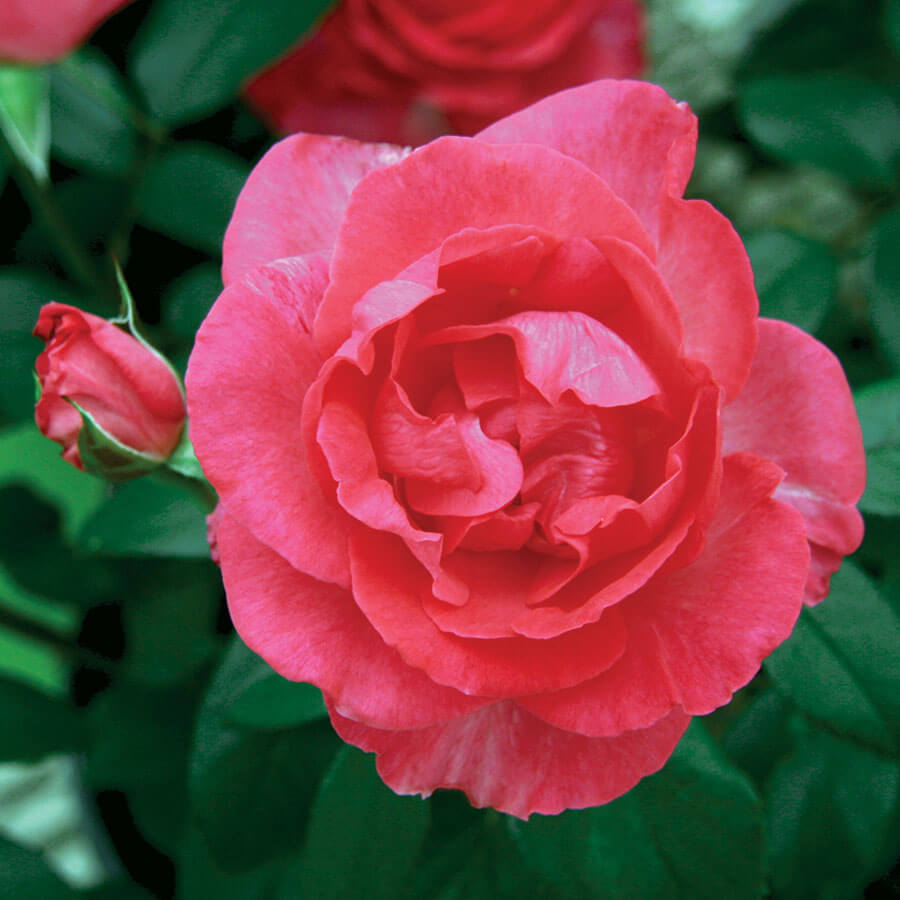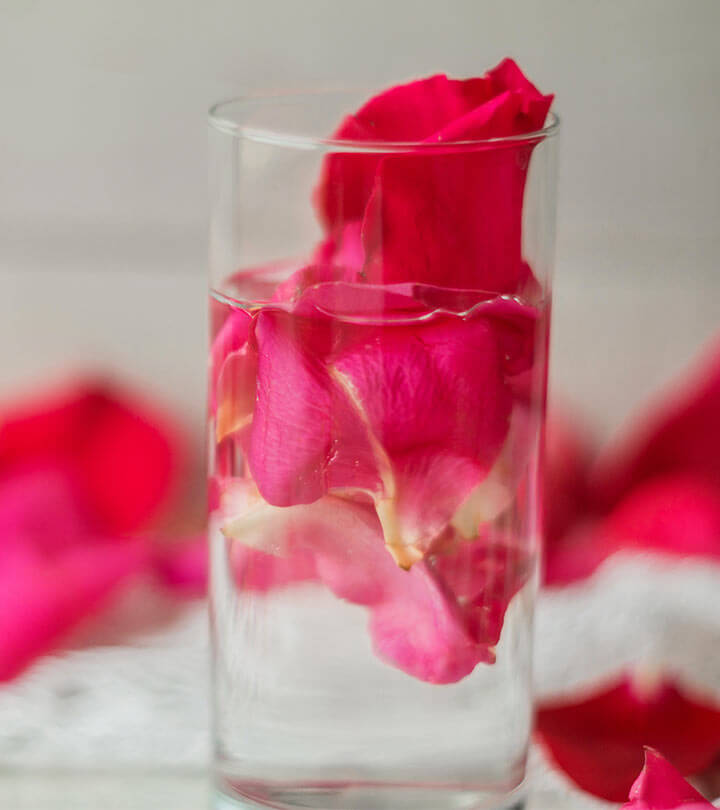The Amazing Benefits of Rose Water


Written and verified by psychologist Valeria Sabater
Rose water holds the oldest and most stimulating health and beauty secrets in its delicate and intoxicating essence. It is used in India and Arabic countries as a basic remedy to rejuvenate skin, for religious ceremonies, and also for dishes. It has amazing properties and, as well as describing these, we’ll be showing you the amazing benefits of rose water.
General benefits of roses:
- Firstly, digestive: including rose petals in your dishes helps cleanse your intestines and alleviate constipation. You can also put them in salads and even make a delicious rose tea.
- Astringent benefits: if you make an infusion, you can benefit from it if you have an eye inflammation and relief is immediate.
- Respiratory benefits. To help to cure flus and colds, you can use the rose bush fruit. This is the fruit that is still in the plant when the rose itself has withered. Firstly, boil them with their seeds, then strain it, and drink two cups a day.
- And, finally, skin benefits: Thanks to rose water and its incredible properties, you can obtain huge benefits in skin healing. Aside from this you can help to prevent skin aging, and cure skin wounds.
Read more: How to Make a Cleansing Juice to Empty Your Intestines Naturally

The benefits of rose water
- It is anti-inflammatory and a decongestant. This is one of the greatest benefits of rose water. Signs of fatigue from a long day are alleviated by this perfumed toner. If you use rose water in the morning, for example, you will see that the dark circles under your eyes will be reduced.
- It relieves headaches. Use it by applying compresses or handkerchiefs that have been soaked in it to your forehead.
- Its high content in Vitamin C is perfect for synthesizing collagen and protecting yourself against free radicals that cause aging.
- It’s relaxing.
- It smooths out dark spots, stretch marks, and wrinkles.
- It prevents hair loss by improving blood flow and strengthening hair follicles.
- Thanks to its B and E vitamins, tannin, and pectin, it is converted into an ideal toner for cleaning and firming up your skin.
- Another of the benefits of rose water is its antibacterial and healing properties make rose water an indispensable ally for sores, skin ulcers, and acne.
Read more: 10 Foods to Help Eliminate Wrinkles
Making rose water
What do I need?
- 1 lb of rose petals
- A pan with a top
- 1 pint of distilled water
- A glass bottle with an air-tight seal.

Instructions:
- Firstly, pick the rose petals. Normally pink and red roses have the best fragrance. You will have to pick a pound of petals. Also, if you are collecting the roses yourself, try to do it in the morning, which is when they have more properties.
- Then fill the pan with a half liter of distilled water. Distilled water is always better than regular water. You will have no problem finding it in a supermarket. Once the pan is filled with a half liter of distilled water, add in the pound of rose petals, and start to boil them.
- This is the most important step. When you see it has started to boil, lower the heat. The steam cannot escape because the steam is exactly what contains the essential oils of the roses, and what has the most properties. Once you have lowered the heat, keep it on for ten more minutes and then turn it off.
Final steps
- After this, leave it for another hour, as if it were an infusion and let it sit.
- Once all the steam has gone, put it through a filter so that only the rose water remains.
- Next, put the water in a glass bottle, shut it tight, and leave it in the refrigerator. You can start to use the rose water the next day. The coolness of the rose water will serve as a perfect toner for your skin to clear it up, tone it, and heal it.
You’ll now be able to enjoy all the benefits of rose water!
All cited sources were thoroughly reviewed by our team to ensure their quality, reliability, currency, and validity. The bibliography of this article was considered reliable and of academic or scientific accuracy.
- Boskabady MH, Shafei MN, Saberi Z, Amini S. Pharmacological effects of rosa damascena. Iran J Basic Med Sci. 2011 Jul;14(4):295-307.
- Duroux R, Mandeau A, Guiraudie-Capraz G, Quesnel Y, Loing E. A Rose Extract Protects the Skin against Stress Mediators: A Potential Role of Olfactory Receptors. Molecules. 2020 Oct 16;25(20):4743.
- Iran J Basic Med Sci. 2011 Jul-Aug; 14(4): 295–307. Pharmacological Effects of Rosa Damascena.
- Jo S, Jung YS, Cho YR, Seo JW, Lim WC, Nam TG, Lim TG, Byun S. Oral Administration of Rosa gallica Prevents UVB-Induced Skin Aging through Targeting the c-Raf Signaling Axis. Antioxidants (Basel). 2021 Oct 22;10(11):1663.
- Lee MH, Nam TG, Lee I, Shin EJ, Han AR, Lee P, Lee SY, Lim TG. Skin anti-inflammatory activity of rose petal extract (Rosa gallica) through reduction of MAPK signaling pathway. Food Sci Nutr. 2018 Oct 25;6(8):2560-2567.
- Pullar JM, Carr AC, Vissers MCM. The Roles of Vitamin C in Skin Health. Nutrients. 2017 Aug 12;9(8):866.
- Rasheed HM, Khan T, Wahid F, Khan R, Shah AJ. Chemical Composition and Vasorelaxant and Antispasmodic Effects of Essential Oil from Rosa indica L. Petals. Evid Based Complement Alternat Med. 2015;2015:279247.
- Thring TS, Hili P, Naughton DP. Antioxidant and potential anti-inflammatory activity of extracts and formulations of white tea, rose, and witch hazel on primary human dermal fibroblast cells. J Inflamm (Lond). 2011 Oct 13;8(1):27.
This text is provided for informational purposes only and does not replace consultation with a professional. If in doubt, consult your specialist.








